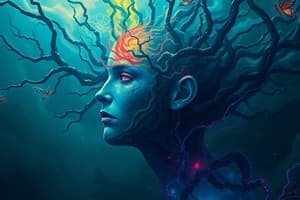Podcast
Questions and Answers
Which of these is included in the DSM-5 criteria for schizophrenia?
Which of these is included in the DSM-5 criteria for schizophrenia?
Schizophrenia is categorized as a ____ mental disorder.
Schizophrenia is categorized as a ____ mental disorder.
What is the average age of onset for schizophrenia in men?
What is the average age of onset for schizophrenia in men?
23
According to the diathesis-stress perspective, what factors play a significant role in the development of schizophrenia?
According to the diathesis-stress perspective, what factors play a significant role in the development of schizophrenia?
Signup and view all the answers
The prodromal phase of schizophrenia is characterized by full-blown, noticeable symptoms.
The prodromal phase of schizophrenia is characterized by full-blown, noticeable symptoms.
Signup and view all the answers
Negative symptoms of schizophrenia are characterized by an excess or distortion of normal functions.
Negative symptoms of schizophrenia are characterized by an excess or distortion of normal functions.
Signup and view all the answers
Which of the following is NOT a negative symptom of schizophrenia?
Which of the following is NOT a negative symptom of schizophrenia?
Signup and view all the answers
The ______ phase of schizophrenia is marked by a return to prodromal-like symptom levels.
The ______ phase of schizophrenia is marked by a return to prodromal-like symptom levels.
Signup and view all the answers
Which of the following is an example of a psychomotor symptom of schizophrenia?
Which of the following is an example of a psychomotor symptom of schizophrenia?
Signup and view all the answers
Which of the following theories suggests that biological deficiencies can contribute to the development of schizophrenia?
Which of the following theories suggests that biological deficiencies can contribute to the development of schizophrenia?
Signup and view all the answers
Which of the following is NOT a sociocultural factor considered related to schizophrenia?
Which of the following is NOT a sociocultural factor considered related to schizophrenia?
Signup and view all the answers
Which of the following is categorized as a positive symptom of schizophrenia?
Which of the following is categorized as a positive symptom of schizophrenia?
Signup and view all the answers
Study Notes
Lecture 18: Symptoms & Theories of Schizophrenia
- Schizophrenia is a severe, chronic mental illness.
- It falls on the severe end of the schizophrenia spectrum.
- It causes significant personal, social, and occupational impairment.
- A key feature is psychosis, which includes hallucinations and delusions.
What are we covering today?
- DSM-5 Criteria
- Categories of Symptoms
- Phases of Schizophrenia
- Etiology of Schizophrenia
Statistics
- Lifetime prevalence of schizophrenia is 1 in 100 individuals.
- Globally, there are approximately 20 million people with schizophrenia.
- In the United States, about 3.2 million people experience schizophrenia.
- Average age of onset is 23 for men and 28 for women.
DSM-5 Criteria of Schizophrenia
- Diagnostic Criteria: Symptoms must persist for at least 6 months, with a marked decrease in functioning in at least one area
-
Symptoms: 2 or more, Including:
- Delusions
- Hallucinations
- Disorganized speech
- Abnormal motor activity (catatonia)
- Negative symptoms
Types of Schizophrenia
- Type I: Better pre-morbid adjustment, later symptom onset, higher likelihood of improvement, more closely linked to brain abnormalities.
- Type II: Tied to abnormalities in the brain.
Categories of Symptoms
- Symptoms are categorized into 3 groups: positive, negative, and psychomotor.
Positive Symptoms
- Delusions: False beliefs that are not based in reality.
-
Hallucinations: Sensory experiences that occur without any external stimulus.
- Disorganized thinking and speech
- Loose associations (derailment)
- Neologisms (new words)
- Perseveration (repetition of words or ideas)
- Clang (rhyming words)
- Disorganized thinking and speech
- Inappropriate affect: Display of emotions that don't match current surroundings or events
Negative Symptoms
- Diminished Emotional Expression: Reduced range of emotional expression
- Avolition: Lack of motivation or initiation of purposeful activities
- Alogia: Reduced speech output
- Anhedonia: Inability to experience pleasure
- Social Withdrawal: Reduced social interactions
Psychomotor Symptoms
- Awkward movements
- Repeated grimaces and strange gestures
- Catatonia: marked psychomotor disturbance, presenting as stupor, rigidity, resistance to instructions, or excited, purposeless behavior.
Phases of Schizophrenia
- Prodromal Phase: Deterioration begins, mild symptoms such as social withdrawal, inappropriate affect, communication problems, and grooming neglect.
- Active Phase: Full-blown, significant symptoms are present.
- Residual Phase: Return to prodromal-like levels of symptoms.
Etiology of Schizophrenia: Biological
- Genetics and Heredity: A role exists; closer relatives have higher risk (16% for close relatives, 4% for distant relatives, 1% in general population).
- Diathesis-Stress Perspective: A predisposition combined with environmental stressors can trigger the disorder.
- Biochemical Abnormalities (Dopamine Hypothesis): Possible role of imbalances in neurotransmitters (e.g., dopamine)
Etiology of Schizophrenia: Psychological
-
Psychodynamic:
- Fromm-Reichmann: Schizophrenic mothers; faulty parenting styles may increase risk factors
- Self theorists: Biological deficiencies cause a fragmented self
-
Cognitive-Behavioral:
- Operant conditioning
- Misinterpretation of unusual stimuli
Etiology of Schizophrenia: Sociocultural
- Multicultural Factors: Different racial and ethnic groups have varying rates of schizophrenia; immigrants may have different rates than native-born.
- Social Labeling: Stigma and labeling may affect the experiences and outcomes of those with schizophrenia.
- Family Dysfunction: Factors within families may increase or decrease the risk of schizophrenia.
Studying That Suits You
Use AI to generate personalized quizzes and flashcards to suit your learning preferences.
Related Documents
Description
This quiz covers Lecture 18 on schizophrenia, exploring its symptoms, diagnostic criteria, and underlying theories. It discusses the DSM-5 criteria, categories of symptoms, and the various phases of this complex mental illness. Additionally, key statistics regarding prevalence and onset are provided to enhance understanding.




